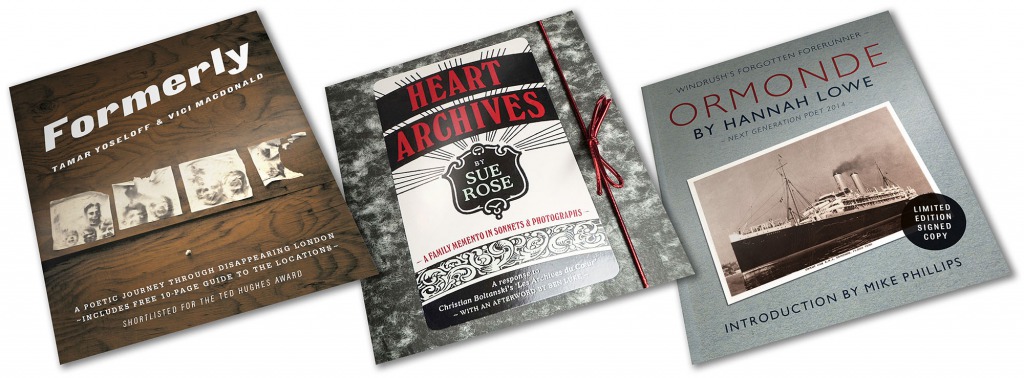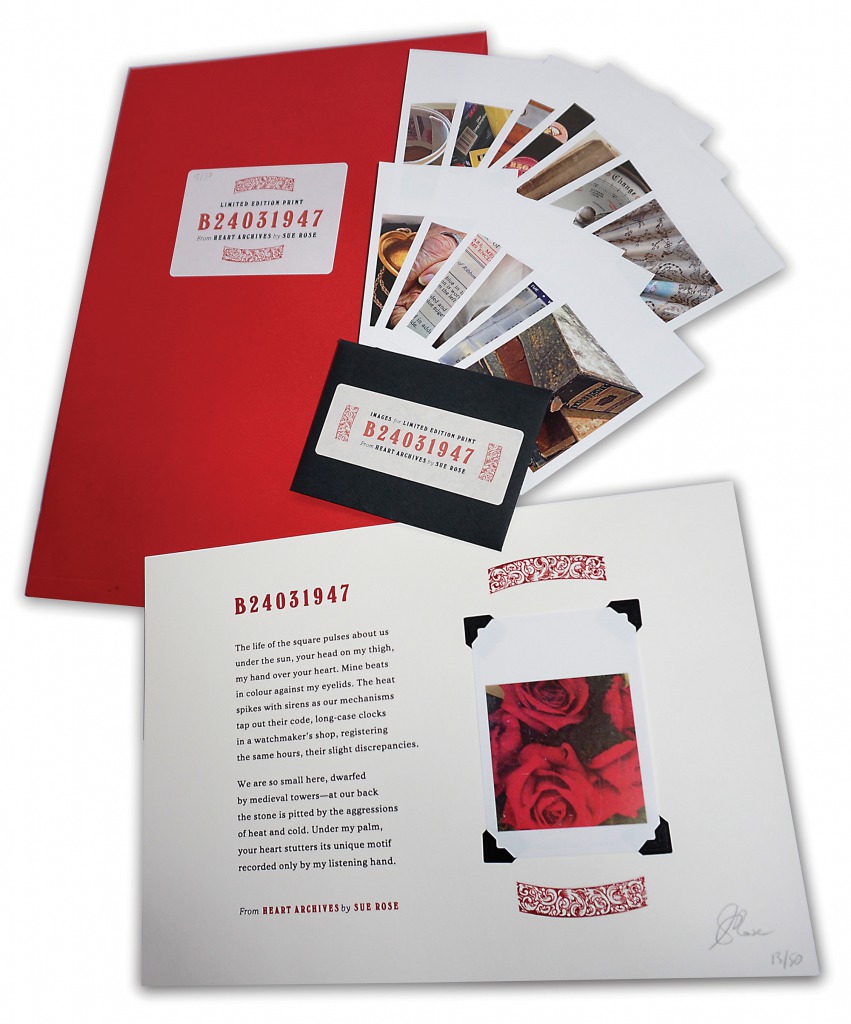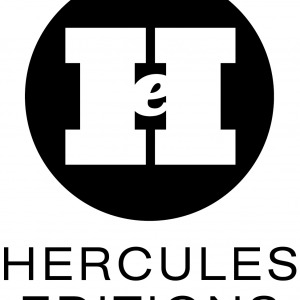In the latest in this series of feature-length interviews with independent publishers, set in our imaginary poetry theatre pub somewhere in Lambeth, we spoke to Tamar Yoseloff and Vici MacDonald, the founders of Hercules Editions…
Hello there, Hercules Editions! What are you drinking?
Tammy: A bottle of Brixton Brewery APA.
Vici: Being an imaginary pub, it serves on-tap macchiato. So that’s what I’m having.
How long has Hercules Editions been running?
Tammy & Vici: We started the press in 2012, initially as a way to publish our collaborative chapbook, Formerly. Its success convinced us there was a niche for books that combined poetry and visual imagery, so we decided to keep going. It was actually an idea that grew out of working on an art magazine together, when we’d commission poets to write new work about contemporary art.
What were some of the practical things you did to get started?
Tammy & Vici: We built our infrastructure around us as we went along, which we’re still doing. In our everyday jobs we’re both self-employed, so already had office space and computers, but we still had to do lots of Hercules-specific stuff like buying domain names, setting up websites, PayPal, a bank account and so on. Our first publication was self-financed, but when we decided to continue, we applied for a grant from the Arts Council to cover costs such as marketing and developing our authors.
Does your personal background lend itself being an independent publisher?
Tammy: I already had both publishing and editorial experience, so it seemed to be a natural extension of those skills. My father was a book publisher, and for a number of years, I worked for the family firm, so I think it’s in the blood! Also, I have been involved in the poetry world as a writer, editor and teacher for over twenty years.
Vici: My passion has always been combining word and image so I’ve spent my career in commercial publishing, mainly on entertainment and art magazines, working across design, writing and editing. I’ve also done quite a bit of design for the marketing departments of big book companies like Penguin Group and Faber, which helped me learn how the pros do things.
Where does the name Hercules Editions come from?
Tammy & Vici: We needed a name that was available as a dot com, which narrows it down somewhat. We both live in Lambeth, with Vici practically opposite the site of William Blake’s last gaff (now a council estate) in Hercules Road. Rumour has it he was keen on combining word and image, and no one else had bagged herculeseditions.com, so the name was perfect.

Could you describe the sort of poetry you publish?
Tammy: In the first instance, we are looking for poetry we like. I’m a pretty voracious poetry reader, and my tastes are very wide. I’m interested in the sort of poetry that uses language in a way that completely surprises me. I like to be knocked out of the familiar. Since the images are integral to the text, we are seeking projects that lend themselves to a visual interpretation. We don’t think of the images that accompany the text as illustration, we want people to see the poetry and visual material as a complete statement.
Vici: I defer to Tammy in all poetry matters, as it’s not my area of expertise; I concentrate more on the book as a whole. Of course we both have to be enthusiastic about the poems, and if I have any doubts she does listen to me.
How are you different from other independent publishers?
Tammy: We are interested in placing ourselves more in the visual arts / book arts genre. When we started, there were very few poetry presses creating this sort of publication, so we hope we have filled (or even created) a niche.
Vici: A lot of small press books look nice, but we try to take that a step further by melding text and imagery with a kind of “third” narrative, to create a total artwork that’s greater than the individual parts. And we always commission essays by the author and a relevant expert, to place the work in context. We’d like to provide a tempting way into serious poetry for people who might otherwise never discover it.
On average, how many books do you sell in a year?
Tammy & Vici: We’re still too new to have large or yearly sales figures. We print in limited signed editions of 300, and our first book Formerly is now in its second edition, while our second book, Heart Archives by Sue Rose, has sold about half its run in the last six months. We’re just about to launch our third book, Ormonde, by the Next Generation poet Hannah Lowe. It’s a gripping mix of poetry, family memoir and archive material about a forgotten forerunner to the famed migrant ship SS Windrush, which we hope will sell to a wide audience. That’s shortly to be followed by Silents, a very different but equally adventurous book on the lost voices of silent film by Claire Crowther, so we have high hopes that our sales will continue upwards.
Do you sell more online or by wholesale/retail?
Tammy & Vici: Our sales are mainly online via our own website, and at author events. We do sell a few in relevant bookshops such as Hoxton’s Bookartbookshop, or Brixton’s Black Cultural Archives, but the margins are too small and the admin too large to make retail a major channel for us at this early stage. Whereas online is brilliant because people can find and buy our books from all over the world, and we retain total control with instant feedback.
What have been some of your biggest successes so far?
Tammy: We were thrilled that Formerly was shortlisted for the Ted Hughes Award. It was an affirmation that we were doing something good!
Vici: And we were so excited when, half way through working on her book, we discovered Hannah Lowe was to become a Next Generation poet.

How important is the physical book design for you?
Vici: The book as an object is very important to us, so we source interesting but cost-effective materials. Our imagery ranges from fine art to film stills, which means image rights are a significant part of our budget. I do all the art direction and layout myself, which for me is the fun part. The look of each book is sparked by its content: for instance Ormonde is based on the design of that ship’s post-war literature, with Gill Sans type, austerity-style uncoated paper, and a travel sticker on the front. The cover and typography of Sue Rose’s Heart Archives was based on her father’s vintage file boxes, the concept being a family album. We directed her to take iPhone photos of cherished items, printed them on snapshot-sized paper and stuck them in by hand (a process we wish never to repeat), then bound the books with shiny red bows sourced from a 150-year-old shop fittings business.
Who prints your books?
Tammy & Vici: It varies by project: we’ll use anything from obscure techniques such as Risograph (a kind of photocopier) and thermography (raised ink) to standard short-run digital printing. We use Solopress when we need a fast turnaround, but sadly our last printer, Butler Tanner & Dennis, recently closed down.
Could you describe your editing process? And how long does it take start to finish?
Tammy & Vici: It’s a streamlined if laborious process, progressing via phone, meetings, email, tracked Word documents, and PDF. Tammy works closely with the author to achieve a set of poems, which are then shaped further as we refine the total concept of the book. Essays are commissioned from the author and an expert, which we both edit. Vici tends to direct the images and captions, working with the author. Tammy is in charge of sourcing endorsements for the back. Once it’s all in place Tammy’s husband Andrew, who’s a professional sub-editor, gives everything a meticulous proof-read. The author is kept in the loop all along, and must be happy with every element. It takes around three months in all to create the book, but there’s also a lot of work involved in launches, events and publicity, which Tammy mainly handles.
What’s your submissions policy?
Tammy & Vici: At the moment, we are aiming to do two books a year, so although we are happy to look at submissions, we are very particular as to the sort of project that’s appropriate for us.
Where do you look for new writers?
Tammy: I am always looking for a project that grabs me; a theme the poet develops and enriches through a sequence. The books we’ve done so far all have an element of the poet as sleuth, trying to track down an elusive truth or story.

What advice would you give to poets today trying to get published?
Tammy: Make the collection as strong as you can. In my other life as tutor, I work with poets who are putting first books together. A collection should read as a sinuous whole, not just a bunch of random poems thrown together. Have a theme, a metaphor that runs through the book. And be patient. This is a difficult time for poetry publishing, and so it is taking longer to get placed. If the work is good, you will get there eventually.
How do you pay your writers? How does remuneration work?
Tammy & Vici: We pay a standard percentage of net sales, on both books and extras such as limited edition prints. Authors can buy their book at a good discount, and we allow them to sell direct at readings. We also create workshops and events around our projects, which is another way writers can capitalise on their work.
What is your approach to marketing and promotion?
Tammy & Vici: We do a lot of our promotion through social media and we are building up a mailing list. Tammy’s big on Facebook, where there’s a very supportive community of writers. Vici meanwhile has thousands of arty Twitter followers. We’re always looking for new connections, as we want to get our books and events into places where poetry isn’t normally encountered, such as art galleries.
What would help? Do you think the state or any other institution should do more for independent publishers?
Tammy & Vici: The Arts Council has been very supportive to us so far, but any promotion of the arts is always welcome. We are always aware of working in a very small sector, and it is sometimes a struggle to get the word out. It would be lovely if there were some kind of network for micro-publishers to share experiences and knowledge – for instance, these pub chats are a great resource.
Do you work full-time as a publisher?
Tammy & Vici: Doing Hercules Editions for love, we both have to fit it in with our own careers: Tammy as a poet and tutor, Vici as a freelance designer and editor. It’s hard sometimes, as our work schedules are very different.
What do you think is a suitable second occupation?
Tammy: I think being a poetry tutor means I’m constantly engaged with what’s going on.
Vici: Something regular but not all-consuming would be great – say a guaranteed 10 days a month laying out a lovely easy magazine. Or, preferably, a lottery win. I would then happily do publishing full-time.
Who distributes your books and where can I buy them?
Tammy & Vici: We have a website, www.herculeseditions.com, where readers can order by PayPal. We distribute the books ourselves.
Do you have any staff? If so, how many?
Tammy & Vici: No, we’re too small, though we hire in help occasionally as necessary, eg for subbing or assembling books.
Apart from books/pamphlets, what else do you make?
Tammy & Vici: For each book we make a limited edition print of some kind – for instance a tabloid newsprint poster for Formerly, and a thermographic print with interchangeable images for Heart Archives. We also have plans to create audio guides and e-books in the future.
What other indie publishers do you like?
Tammy: I’m a big fan of Penned in the Margins and Miel because they both create beautiful and interesting books. I like the fact that Penned in the Margins is commissioning live performance work as well.
Vici: I look to indie art organisations such as Artangel, who match artists with unusual spaces then work closely with them to create amazing site-specific works. With Hercules Editions we’re trying to do the same, it’s just that our site’s a book.

How optimistic are you about the future of independent publishing? Are you satisfied with your own solutions to the problems it currently faces?
Tammy & Vici: It seems a good time to be doing independent publishing: the internet has opened up a world of possibilities, and technology keeps getting cheaper. Lack of time is the main limiting factor, but we’re always striving to do more, for instance developing our website, or branching into e-books.
Do you have anything to add about e-books / Amazon / the Internet that hasn’t already been said a thousand times before?
Tammy & Vici: You don’t always have to use Amazon: we haven’t so far, as their fee structure for physical books would give us a tiny margin and take pricing out of our hands.
What advice would you give to someone starting their own independent publishing business today?
Vici: Just go for it! And treat your authors nicely.
Tammy: You have to love what you’re doing. It’s hard work, and it’s hard to make money, so the initial impetus should be that you want to make something beautiful and worthwhile.
Tell me something about being an independent publisher that most people don’t know.
Tammy & Vici: Do you mean all the secret “independent publisher perks” like guaranteed flight upgrades and groovy members’ clubs and boutique hotel deals? Well, it is an imaginary pub…
…
Pub Chat aims to highlight the extraordinary amount of interesting poetry presses there are today, and the amazing work they do and the incredible writers they publish. We hope this series will give poets and writers alike a greater knowledge of the independent publishing landscape as a whole, as well as providing a public forum where publishers can be honest, open and candid about publishing as a business. Note: a selection of these questions have been taken from Cyril Connolly’s 1946 ‘The Cost of Letters’ survey.

Add your Reply
You must be logged in to post a comment.